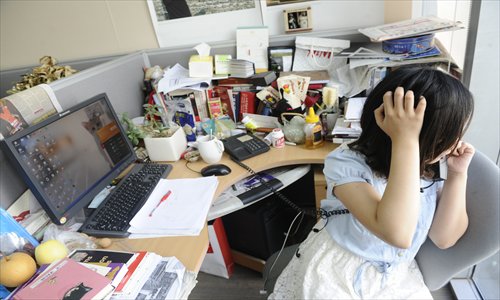HOME >> METRO BEIJING
Office chaos
By Chen Ximeng Source:Global Times Published: 2014-8-28 19:38:01
Is a cluttered desk a sign of a cluttered mind?

More people feel troubled by messy workplaces which can overwhelm and disrupt efficiency. Photo: Li Hao/GT
Thirty-two-year-old Yuan Chunnan's life was once disorganized and chaotic. Her messy lifestyle carried over into her work life where her professionalism and efficiency suffered greatly due to her bad habits."My work area used to be so messy that I had to sit at the narrower side of the desk," said Yuan. "Most of my work space was overwhelmed with piles of papers, books, plastic bags and all kinds of food."
Three years ago, Yuan has a serious incident at work regarding an invoice she had lost due to the messiness of her workplace. This incident made Yuan realize the importance of organization at work.
"Working at a messy desk, I often lost documents and failed to find the right contact numbers when I needed them," explained Yuan. "But I never expected that my messy ways would result in the loss of an invoice worth hundreds of thousands of yuan."
Eventually, she had to spend 1,000 yuan ($162) to create another invoice of the same worth. The worst part of the experience, however, was the scrutiny she faced from her fellow colleagues and bosses.
Since then, Yuan has forced herself to learn to stay organized at work and has now become a full-time organizing consultant. "An increasing global trend has seen the art of organization promoted in the workplace. More people feel messy workplaces can overwhelm and disrupt tasks," said Yuan. "An disorganized working style means low efficiency and a bad impression on your bosses."
Yuan took the statistics of American executives to demonstrate this importance of organization. According to a 2004 survey of 2,600 executives of Esselte, a manufacturer of office supplies, American executives waste six weeks per year searching for lost documents.
However, not everyone is convinced that an organized workplace will produce better results. Psychological scientist Kathleen Vohs believes that sitting in a messy room can help increase peoples' creativity.
"Working in a messy room can lead to something all firms, industries and societies want more of which is creativity," said Vohs, when talking with the Daily Mail.
This concept of gaining creative inspiration from a messy work desk was also shared by the late German-born scientist Albert Einstein, who quipped, "If a cluttered desk is a sign of a cluttered mind, of what, then, is an empty desk a sign?"
Although people question the effect an organized workplace actually has on an employee's performance, Yuan has had great success in hosting a series of seminars to teach people how to make work more organized. She has found that many workers are eager on how to achieve organization in their lives.
Another advocate of organized work areas, Zhang Xue (pseudonym), an employee at a book publishing company, believes that the development of an organized working style is vital to productivity and can be achieved with some straightforward methods.
"Take an office desk for example. The most important principle is to set up an area and fix the location of different things," said Zhang. "Paper, pen and books should be on the right of the desk. And cups and cellphones should be placed on the left."
The effect a messy workplace can have on an employee can vary from person to person, but for some an organized work desk can make all the difference in how happy and productive they are at work, said Yuan.
Posted in: Metro Beijing